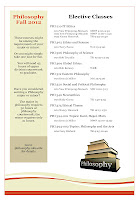Saturday, February 25, 2012
Monday, February 20, 2012
Free John Searle Classes Online
Berkeley has posted three of John Searle's philosophy classes online for free.
You can’t dabble in the world of philosophy very long without encountering John Searle. One of America’s most respected philosophers, Searle did important work on “speech act” theory during the 1960s, then later turned to consciousness and artificial intelligence, out of which came his famous “Chinese room” thought experiment. Searle has taught philosophy at UC-Berkeley since 1959, and, until recently, his courses were only available to matriculated students. But this fall semester, the good folks at Berkeley recorded three courses taught by Searle, and made them available online.Free John Searle classes (Open Culture)
Saturday, February 18, 2012
Philosophers' Cafe - Cosmopolitanism
Join us at the Philosophers' Cafe as we discuss Cosmopolitanism. Are we all citizens of the world? Do we bear special responsibilities to others around the world? How should we balance our obligations to our countries and to citizens of other countries around the world?
Friday, February 24 from 3:00-4:00 in SU 105.
Friday, February 24 from 3:00-4:00 in SU 105.
Saturday, February 11, 2012
Spinoza's vision of freedom, and ours
Spinoza's vision of freedom...
Well before John Stuart Mill, Spinoza had the acuity to recognize that the unfettered freedom of expression is in the state’s own best interest. In this post-9/11 world, there is a temptation to believe that “homeland security” is better secured by the suppression of certain liberties than their free exercise. This includes a tendency by justices to interpret existing laws in restrictive ways and efforts by lawmakers to create new limitations, as well as a willingness among the populace, “for the sake of peace and security,” to acquiesce in this. We seem ready not only to engage in a higher degree of self-censorship, but also to accept a loosening of legal protections against prior restraint (whether in print publications or the dissemination of information via the Internet), unwarranted surveillance, unreasonable search and seizure, and other intrusive measures. Spinoza, long ago, recognized the danger in such thinking, both for individuals and for the polity at large. He saw that there was no need to make a trade-off between political and social well-being and the freedom of expression; on the contrary, the former depends on the latter.
Friday, February 10, 2012
A Homepage for Philosophy
If you haven't done so yet, you should checkout the Stanford Encyclopedia of Philosophy. It's a wonderful resource for philosophers, with a large number of various entries written by credible authors. With each entry you'll also find a solid reference list and links to online resources.
The SEP’s approach seems to have worked. The resource’s credibility and accuracy are unquestioned..., and it attracts an abundant audience, with between 600,000 and 700,000 accesses per week during the academic year.A Home page for Philosophy
Monday, February 06, 2012
Eternal Sunshine...
We screen the film Eternal Sunshine of the Spotless Mind on Friday at 3:00 in Budig Theater. For those not familiar with the movie, here is a summary from the film's web site:
From acclaimed writer Charlie Kaufman and visionary director Michel Gondry comes Eternal Sunshine of the Spotless Mind. An all-star ensemble cast shines in this comical and poignant look at breakups, breakdowns and breakthroughs. Joel (Jim Carrey) is stunned to discover that his girlfriend, Clementine (Kate Winslet), has had their tumultuous relationship erased from her mind. Out of desperation, he contacts the inventor of the process, Dr. Howard Mierzwiak (Tom Wilkinson), to get the same treatment. But as his memories of Clementine begin to fade, Joel suddenly realizes how much he still loves her. Kirsten Dunst, Mark Ruffalo and Elijah Wood co-star in Eternal Sunshine of the Spotless Mind - a memorable film that The Wall Street Journal calls "a romantic comedy unlike any other!"You can read a nice paper by Christopher Grau on the "Morality of Memory" at http://bit.ly/yajDfb. As Grau points out, the film introduces the inverse of Nozick's Experience Machine and has us asking questions about the erasure of accurate memories. Grau explores the moral dimensions of this. There is also a nice reference in the movie to Nietzsche's idea of eternal reoccurrence.
Wednesday, February 01, 2012
Philosophy and the Science of Happiness
Students are encouraged to submit papers to a conference entitled,
“Philosophy and the Science of Happiness.” It will be held Saturday,
April 14th, 2012, at George Mason University in Fairfax, Virginia. Dr.
Erik Angner is the main speaker and will be speaking on the conference
theme. College students may present on any topic relating to philosophy,
including economics topics; students must submit essays for approval by
March 1st, 2012 in order to present at the conference. Included as part
of the conference is an essay contest for undergraduate students.
Students may use papers that they have already written for class.
Registration is FREE and is now open.
The specifications for the essays along with other details of the conference may be found at: philosophy.gmu.edu/events/2169 . One can e-mail gmuphilosophyconference@gmail.com for more information. Check out the Facebook event page: http://www.facebook.com/events/329212190439166/.
Registration is FREE and is now open.
The specifications for the essays along with other details of the conference may be found at: philosophy.gmu.edu/events/2169 . One can e-mail gmuphilosophyconference@gmail.com for more information. Check out the Facebook event page: http://www.facebook.com/events/329212190439166/.
Subscribe to:
Comments (Atom)




